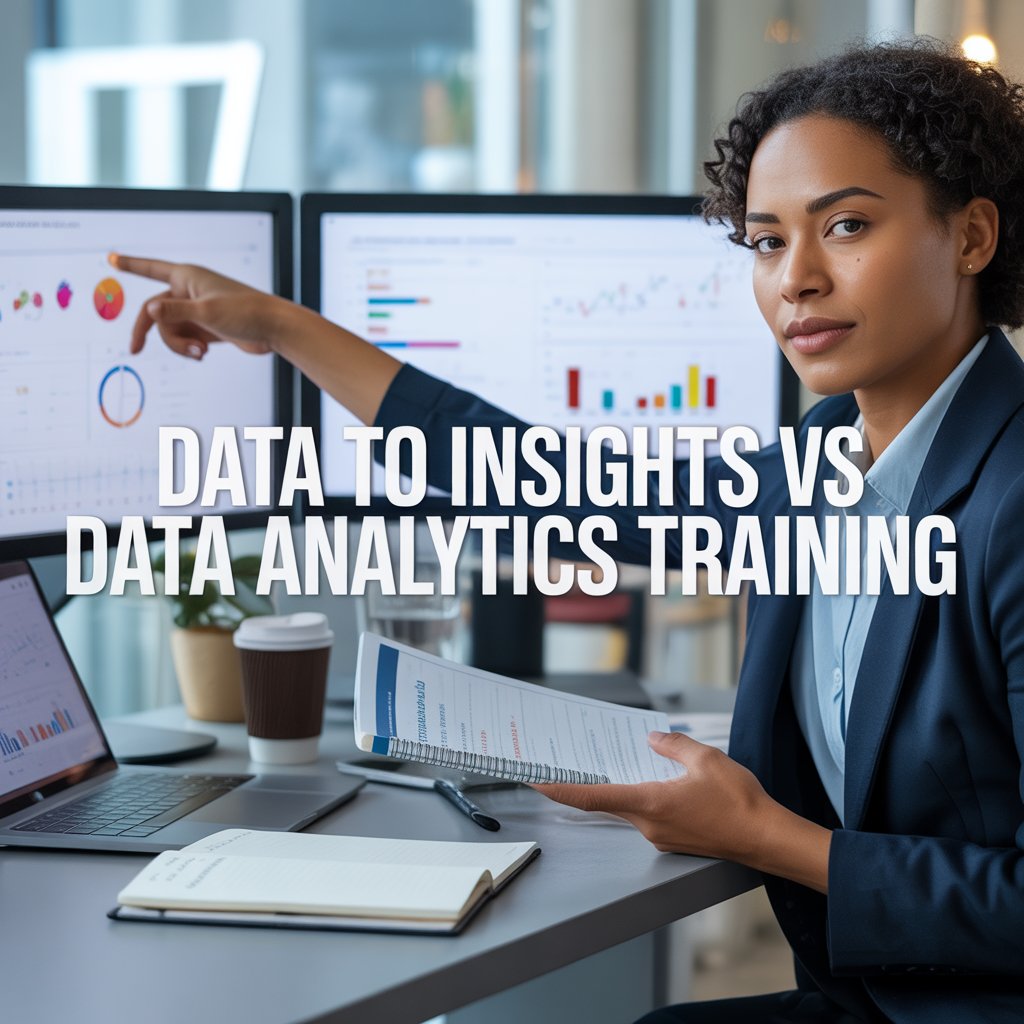In a world brimming with data, the skill to interpret and leverage it has become an essential competency. The transition from raw data to actionable insights does vary. It depends on the type of analysis and context implied.
Are you also trying to find the best route to develop your data skills? It is the dilemma often faced by most professionals. They feel stuck in making the decision. Which learning pathway aligns with their current role, skill level, and ambitions? Do you wonder which training aligns with your career goals and current expertise?
This guide delves into the critical distinctions between two essential learning paths. Therefore, offering clarity to help you make an informed, confidence-boosting decision.

Jump ahead to
Why is a Clear Perspective on Data Important?
The foundational skill that turns numbers into meaning, or actionable information, is crucial at all levels. In other words, you have gained the specialized skill set to not just look at data as numbers. Moreover, as a language. It relays the story behind organizational performance, customer patterns, and operational efficiency. This leadership skill is useful in spaces where rapid decisions and clear communication are needed. However, this doesn’t involve engagement in analytic depth.
Think of a sales manager entrusted with monthly reports. Overwhelming spreadsheets don’t turn them down. Rather, they gain the facility to summarize, visualize, and explain trends. This facility boosts productivity, reduces misinterpretation, and creates a transparent decision environment.
Harnessing Data to Insights
According to the World Economic Forum, understanding how to convert numbers and tables into digestible, decision-making information has become increasingly important in 2025. A succinct yet focused training experience is essentially needed. It must involve the teaching of preparing, organizing, cleaning, and visualizing data.
This approach benefits a broad audience. It includes team leaders, marketing professionals, project managers, and operational staff. Moreover, everyone who regularly interacts with data but does not need deep statistical knowledge. For example, a project manager in charge of customer service and exposed to considerable amounts of feedback data. He utilizes insights from training like Data Analytics for Project Managers . It aids in summarizing and transmitting results that focus attention on daily remedies. Therefore, enhancing client service performance.
Besides skill acquisition, this training initiates a mindset shift toward data fluency. This shift with accessibility quickens the process of everyday decisions. Moreover, creating a streamlined process where everyone contributes faster and collaborates loosens siloed decisions. Certification earned through this course provides formal acknowledgment of your capability. It helps to make data-informed decisions confidently and accurately.
To gain a fuller understanding of the value of Data to Insights, we will review the key aspects:
Rapid Everyday Decision-Making
Data to Insights training helps accelerate everyday decisions by making data easier to access and understand. Professionals will learn how to quickly create visual displays to deliver their findings in obvious ways. This will mitigate doubt and minimize misinterpretation, and will help accelerate responses to business conditions. The training hones skills to confidently act on proven and consistent patterns in data.
Creating a Shared Data Culture
The training builds to a culture where data and fluency will be commonplace in every team. The sharing of insights will be supported in an easily accessible and understandable format. Because departments act upon data together, collaboration improves. The shared use of data can even serve as a bridge to breaking down departmental silos. This departmental teamwork can lead to immeasurable efficiencies for the organization.
Moulding Agile Business Responses
When teams are able to derive data and create meaning from the data, businesses can remain nimble. They are empowered to notice trends or behavioral patterns and act. It allows teams to continually improve and respond to business issues. Agility is key, especially in a fluid market. Data fluency helps an organization to pivot its strategy when needed.
The Role of Advanced Data Analytics
Basic interpretation provides suggestive insights quickly. Whereas larger-scale interpretation needs advanced methods. Complex problem-solving that involves forecasting, predictive modeling, or a level of optimization comes with advanced analytical competency. This level of competency can help create opportunities. However, it requires greater responsibilities and offers a level of influence. Therefore, it might include the following functions. Data analyst, business intelligence professional, or analytics consultant.
Take the example of a business analyst. Someone who utilizes predictive models informed by advanced analytics approaches. They can make informed projections using GEN AI about customer churn rates and specify appropriate organizational strategies to counteract them. Greater analytical depth and sophistication facilitate organizational management of uncertainty. In addition, leveraging emergent opportunities with statistical understanding. Moreover, the recommendations become easier to understand, too.
In the larger picture, this certification might be useful. It helps demonstrate your ability to tackle complex data quandaries. Additionally, to present nuanced insights as significant business recommendations.
In a rapidly changing industry, advanced analytics is invaluable. The points below explore how these specialized skills create value and develop progress in organizations.
Enabling Predictive Planning
Advanced analytics enable practitioners to project multiple future possibilities based on historical data and trend analysis. Extracting predictive models reveals patterns from historical data that were previously either ignored or hidden. Holding insights about where we are going in the future positions organizations to proactively prepare. They can prepare to face challenges and opportunities. Predictive planning works to strengthen decision-making.
Leverage AI to Enable Better Informed Solutions
The inclusion of AI tools increases the speed and precision of analytics as used in advanced analytics. AI algorithms are capable of cutting through contrasting or complex datasets to achieve increased efficiency and precision. This ultimately provides smarter, data-driven recommendations. It solves problems or challenges otherwise incomprehensible due to the high volume of data.
Manage Risks with Statistical Precision
Advanced analytics help to effectively quantify, predict, and manage organizational risks. Statistical techniques identify potential uncertainties or a range of uncertainties and likely associated impacts. Practitioners, through careful consideration of the data developed model, can develop features to weigh risk against rewards. The more precisely uncertainty is understood, can lead to reduced uncertainty and risk to mission accomplishment or profitability.
How a Vigorous Data Force is Formulated?
Organizations derive significant value. General-level data literacy pervades the front lines and managerial ranks. The more complex analytics competencies reside with specialists working on strategic problems. The former drives more rapid, smarter daily decision-making. Whereas the latter drives innovation, efficiency, and strategy. Professionals who know where their competencies lie and collaborate across these domains. They create a dynamic, responsive data culture.
Who Should Choose Which Path?
- If your workflow involves rapidly applying data to practice. Especially, without delivering an analysis of vigorous statistics. Or if your goal is to integrate data fluency into an operations or management job. In that case, the introductory course is a good fit.
- If you aim to analyze large datasets, build predictive models, or lead data-driven projects. These have implications for organizational strategy. Continuing education offers you the tools, including AI, and the knowledge you seek.
Besides relevance to job choice, both accredited courses elevate your career prospects. This is done by offering an accredited skillset recognized by employers. Certified professionals frequently have better career options and increased earning potential. Moreover, they are eligible for leadership roles.
The Impact of Certification
Obtaining an accredited certification enhances your employability. A credible certification signifies that your skills meet industry standards. It also indicates that you can help organizations apply data responsibly. It is done considering social and strategic implications. Certifying your skills contributes to your significance in navigating a competitive job market. There are also other aspects of certification. It involves job security, increased earnings, and promotional opportunities.
Side-by-Side Consideration: Breaking down the main contrasts
First, compare the primary features you are looking for in a course. Then selecting your course becomes relatively easier. The following table highlights the main features and will inform your decision-making.
| Feature | Data to Insights Training | Advanced Data Analytics Certification Training |
| Duration | 1 day | 4 days |
| Skill level | Foundational, practical data interpretation | Advanced statistical analytics and predictive modeling |
| Focus Areas | Data cleaning, visualization, basic analytics | Statistical modeling, forecasting, data storytelling |
| Tools Covered | Spreadsheet software, basic visualization tools | Power BI software, statistical and programming tools |
| Target Audience | Professionals seeking quick, applicable insights | Professionals preparing for complex analytical roles |
| Certification Outcome | Validates basic data interpretation skills | Validates advanced analytical expertise |
Skills Beyond the Numbers
In addition to technical proficiency, communication and critical thinking skills are essential. They are necessary to translate data findings into persuasive action. Effective communication allows for insight into analysis. Additionally, to be impactful in the decision-making process. Moreover, it bridges the gap between analysis and action.
Conclusion
Choosing between Data To Insights Training and Advanced Data Analytics Certification Training depends on what you aim to achieve in your career. If you want to simplify data for daily decisions and communication, Data to Insights Training is a great choice. It helps you interpret information and share it with clarity. For complex analysis and predictive models that drive strategy, Advanced Data Analytics Certification Training offers the right tools. Both courses enhance your confidence to make smarter, data-driven decisions. Enroll today and take the next step toward becoming a data-savvy professional.
FAQs on Data to Insights vs Data Analytics Training
1. Differentiate between Data to Insights and Data Analytics Training?
Data to Insights equips learners with the practical skill of interpreting and visualizing the data, used for making everyday decisions. For Data Analytics training, it is the use of advanced analytical methods like predictive modeling and statistical analysis.
2. Who is the target audience for Data to Insights Training?
People working with data daily, and who do not require deep statistical knowledge like managers, team leads, and marketers.
3. Who is the right person for the Advanced Data Analytics Training?
Anyone aiming to deal with forecasting, and building of predictive models, like data analysts and business intelligence professionals, etc.
4. What is the duration of these trainings?
Data to Insights is a one day training. Advanced Data Analytics Certification Training is a 4-day course
5. Which tools are commonly taught in these training?
For Data to Insights, spreadsheets and basic visualization tools are taught. Power BI, statistical software, and programming tools are covered in Advanced Data Analytics.
6. Do these certifications make my career valuable?
These certifications demonstrate skills, add credibility, and enhance job prospects.
7. Is Data to Insights Training useful for non-tech professionals?
Yes, as it creates data fluency. Thus makes the insights derived from complex data through better decision-making.
8. Is it necessary to have previous experience to attend Advanced Data Analytics Training?
It is an advantage, but it is not a must. The training usually starts from the basics.
9. How do Data to Insights Training and Data Analytics Training impact organizational decision-making?
Data to Insights accelerates everyday decision-making, while Advanced Analytics drives innovation, efficiency, and strategic planning.
10. Can I combine both Data to Insights Training and Data Analytics Training sessions for career growth?
Yes, foundational skills complement advanced techniques. Understanding both levels creates a well-rounded, effective data professional.



